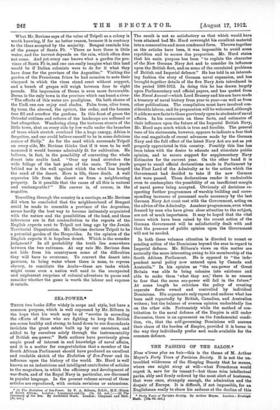SEA-POWER.*
THESE two books differ widely in scope and style, but have a common purpose, which is well expressed by Mr. Silburn in the hope that his work may be of "service in seconding the efforts of those who are fighting to keep the British sea-sense healthy and strong, to hand down to our descendants inviolate the great estate built up by our ancestors, and added to by ourselves solely through the instrumentality of. British sea-power." Both authors have previously given ample proof of interest in and knowledge of naval affairs, and it is a matter for congratulation that a member of the South African Parliament should have produced an excellent and readable sketch of the Evolution of Sea-Power and its influence upon the history of the world. Mr. Hurd is well known as an industrious and intelligent contributor of articles to the magazines, in which the efficiency and development of war-fleets, and of the Royal Navy in particular, are discussed in popular language. In the present volume several of these articles are reproduced, with certain revisions or extensions.
• (1) The Brolution of Sea-Power. By P. A. Silburn, D.S.O., M.P. (Union of South Africa:. London : Longman and Co. (7s. 6d. net.],--(2) The Command qf the Sea. By Archibald Hurd. London: Chapman and Hall. [ba. net.]
The result is not so satisfactory as that which would have been attained had Mr. Hurd rewrought his excellent material into a consecutive and more condensed form. Thrown together as the articles have been, it was impossible to avoid some repetition and to secure due proportion. Mr. Hurd states that his main purpose has been " to explain the character of the New German Navy Act and to consider its influence upon the British fleet, and on some of the correlated problems of British and Imperial defence." He has told in an interest- ing fashion the story of German naval expansion, and has brought together details of the five Navy Acts introduced in the period 1898-1912. In doing this he has drawn largely upon Parliamentary and official papers, and has quoted from the Naval Annual—which Lord Brassey and his son have made a treasury of naval history from year to year—as well as from other publications. The compilation must have involved con- siderable labour, and its preparation will be welcomed, although it adds no new facts to those previously open to students of naval affairs. In his comments on these facts, and estimates of their influence upon the future of the Imperial British Navy, Mr. Hurd says much which is true and forcible. The general tone of his statements, however, appears to indicate a fear that the real magnitude of recent advances made by the German Navy and the full effect of the latest Navy Act are not as yet properly appreciated in this country. Possibly this line has been taken with the desire to educate and stimulate public opinion, and to secure support for supplementary Navy Estimates for the current year. On the other hand it is proper to recall official declarations made in Parliament by the First Lord of the Admiralty as to the action which the Government had decided to take if the new German Act were passed. These declarations render it undesirable even to contemplate the possibility of an insufficient margin of naval power being accepted. Obviously all decisions re- specting further programmes of warship building and corre- sponding increases of personnel made necessary by the last German Navy Act must rest with the Government, acting on the advice of the Admiralty. Amateur programmes, even when framed by men who have given close attention to the subject, are not of much importance. It may be hoped that the vital issues which have been raised by the recent action of the German Government will be satisfactorily dealt with and that the pressure of public opinion upon the Government will not be needed.
In both these volumes attention is directed to recent or pending action of the Dominions beyond the seas in regard to Imperial defence. Mr. Silburn's views on this matter are naturally the more interesting owing to his membership of the South African Parliament. He is opposed to "the inde- pendent naval policy now entered upon by Canada and Australia." In his opinion as "the sea-power of Great Britain was able to bring colonies into existence and able to make them what they are,' there is no reason to fear that the same sea-power will fail in the future." At some length he criticises the policy of creating separate fleets owned and controlled by individual Dominions. His arguments only repeat and endorse what has been said repeatedly by British, Canadian, and Australian writers ; but the balance of oversea opinion undoubtedly lies on the other side. Fortunately while the method of con- tribution to the naval defence of the Empire is still under discussion, there is an agreement on the fundamental condi- tion, viz., that the self-governing Dominions will assume their share of the burden of Empire, provided it is borne in the way they individually prefer and made available for the common defence.






































 Previous page
Previous page